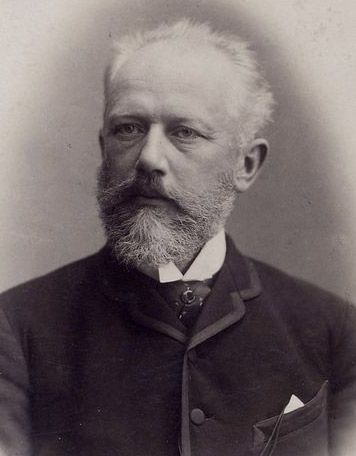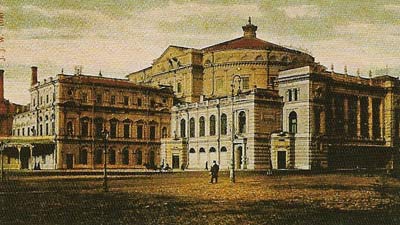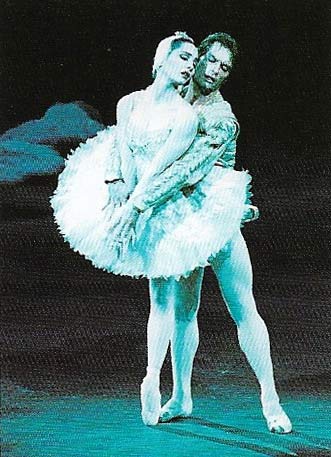Tchaikovsky, Pyotr Ilyich (1840–1893)

Pyotr Ilyich Tchaikovsky

The Mariinsky Theatre in St Petersburg. Many opers and ballets by Tchaikovsky, including The Sleeoing Beauty and The Nutcracker, were first performed there.

A scene from the English National Ballet's 1999 production of Swan Lake, Tamara Rojo and Patrick Armand.
Tchaikovsky stood apart from the self-proclaimed nationalist composers of late-nineteenth century Russia in his constant use of established European forms such as the symphony, the concerto, and the symphonic poem. Even so, his personal idiom was colored by a characteristic Russian emphasis on style, minor keys, and folk-like melody. His popularity today is high, based chiefly on his symphonies , concertos, and ballet music.
Tchaikovsky could claim to be the the world's most popular "classical" composer. His music has always held a special appeal, for its passion, lyricism, extravagant emotionalism, and glowing orchestral color. It reflects the extremes of temperament of its composer: a moody, melancholy character, prone to fits of depression, but also of heightened optimism.
Throughout his life, Tchaikovsky was torn between his desire for a "normal" family life, and his homosexual nature. This constant, unhappy struggle was reflected in his music, particularly the later symphonies. Although associated with "The Mighty Handful", Tchaikovsky was never a member of that nationalist group. Much of his own work, however, draws on a rich vein of Russian folk culture, which he successfully fused with the Western symphonic tradition. He wrote: "As far as the Russian element in my music is concerned, this is because I grew up in the provinces, imbued from earliest childhood with the indescribable beauty of the characteristic natures of Russian folk music."
Early life
Tchaikovsky was the son of a mining engineer, and was born near the Urals. From his delicate, epileptic, French mother he inherited his hypersensitive nature and a tendency to hypochondria. When he was eight, the family moved to St Petersburg, where Tchaikovsky enrolled in the junior department of the School of Jurisprudence, a training-ground for the civil service. By this time, he had acquired twin younger brothers, Anatoly and Modest. He was exceptionally close to his mother, and her shocking death in a cholera epidemic whenTchaikovsky was 14 was a trauma from which he never really recovered.
Tchaikovsky graduated from the School of Jurisprudence in 1859, but found life in the civil service uncongenial. When a new music conservatory opened in St Petersburg in 1862, he enrolled as a student. He graduated in 1866, and found a job as a harmony teacher at the Moscow Conservatory, which had just been established by his mentor, the pianist and composer Nikolay Rubinstein (1835–1881). The successful performance of an early overture in March 1866 encouraged him to start work on a symphony, entitled Winter Daydreams, which was performed under Rubinstein's baton in 1868. Modelled on Mendelssohn's Italian and Scottish Symphonies, it uses melodies influenced by Russian folk tunes.
Music for the stage
Meanwhile Tchaikovsky was working on his first opera, Voyevoda, which was performed at the Bolshoy Theatre in Moscow in February 1869. Shortly afterwards Tchaikovsky met Balakirev, who recognized a major new talent and encouraged Tchaikovsky to tackle the tone poem Romeo and Juliet. Its subject-matter, dealing with the favorite Russian themes of Iove and death, fired the composer's imagination, and it quickly became one of his most popular works.
In May 1872, while staying at the country estate of his beloved sister Alexandra and her family, Tchaikovsky wrote his Second Symphony, known as the Little Russian, which incorporates genuine Ukrainian folk tunes into its musical fabric. it was well received, but he still wanted to achieve operatic success. This eluded him until after his first venture into the world of ballet, with Lebedino ozero (Swan Lake), written for the Imperial Ballet in Moscow. Though its first production in 1877 was a disaster, it was the first of his three great ballet scores the others are Spyashchaya krasaritsa (The Sleeping Beauty), and Shchelkunchik (The Nutcracker) which are still the cornerstones of the classical ballet repertoire.
In 1874 Tchaikovsky's confidence received another severe dent when Nikolay Rubinstein contemptuously rejected his First Piano Concerto as "worthless and unplayable". Tchaikovsky rightly ignored the criticism, and refused to alter the score. After Hans von Billow gave its premiere in Boston, USA, the following year with great success, Rubinstein was forced to admit his mistake. Meanwhile Tchaikovsky – who spent as much time as possible travelling outside Russia — saw Bizet's Carmen in Paris, and Wagner's Ring at the opening of the Bayreuth Festival Opera. Under these twin influences he composed his tone poem Francesca da Rimini (1876), based on the famous episode in Dante's Inferno, and, in complete contrast, the classically poised Rococo Variations for cello and orchestra.
Marriage
Around the same time, he began his long association with the multi-millionairess Nadezhda von Meek, the widow of a railway tycoon, who befriended the composer, commissioned his works, and supported him financially, on condition they should never meet. Her patronage enabled Tchaikovsky to concentrate on composition, and rescued him from the emotional chaos caused by his hasty and imprudent marriage in 1877 to a mentally unbalanced music student, Antonina Milyukova, who had pestered him with love-letters.
Tchaikovsky had evidently hoped that marriage would bring "normality" to his life, but found himself unable to reconcile his wife's physical demands with his homosexuality. An attempt at reconciliation brought him to the brink of suicide, and within weeks of the wedding he fled to the safety of his brother's house in St Petersburg. Tchaikovsky never saw his wife again, though they were never divorced. In 1896, three years after his death, she was declared insane and spent the rest of her life in an asylum.
Fatalism
In the immediate aftermath of his disastrous marriage, Tchaikovsky composed his Fourth Symphony, dedicated to Madame von Meek. He told her, "There is a programme to our symphony ... the introduction is the seed of the whole work ... this is Fate, the fatal force which prevents the realization of our hopes of happiness." From then onwards, his work became increasingly dominated by the idea of Fate. It pervades his opera Eugene Onegin, based on Pushkin's verse novel, a powerful emotional drama set against the colorful background of Russian country life. The opera had uncanny parallels withTchaikovsky's own situation, particularly in the ardent letter written by the heroine, Tatyana, to the insensitive Onegin, who fails to appreciate her true worth until many years later.
The same sense of predestination dominates the Fifth Symphony (1888), whose famous opening theme represents "complete resignation before Fate", while the second movement, with its exquisite opening horn solo, is a radiant love-song. Both Fate and Pushkin provided the scenario for Tchaikovsky's last successful opera Pikovaya dama (The Queen of Spades), a chilling supernatural tale of the death and destruction wrought by a gambler's obsession.
In 1878 Tchaikovsky resigned his teaching job at the Moscow Conservatory. From then onwards he spent much time abroad, in Switzerland, where be completed the Violin Concerto (another work strongly influenced by Russian folk themes), and in Italy (the inspiration of the Capriccio italien and the Souvenir de Florence). In 1880 he commemorated the historic defeat of Napoleon's army with the brash but ever-popular 1812 Overture, which he described as "loud and noisy ... and probably artistically worthless". By 1884 Tchaikovsky felt the need to settle down, and found himself a country house near Klin, outside, Moscow. He renewed one acquaintance, with Balaldrev (who prompted him to compose the Byronic Manfred Symphony), but lost another when, in October 1890, his substitute mother-figure Madame von Meek abruptly discontinued their 14-year relationship.
Last years
The death of his sister in 1891 overshadowed an otherwise triumphant visit to the USA, and by the end of 1892 Tchaikovsky was beset by morbid fears. His last symphony, dubbed the Pathétique by his brother Modest, represents his final confrontation with the Fate that had dogged him. Tchaikovsky said that the symphony's "ultimate essence is Life", but that the anguished finale (marked Adagio lamentoso) represented Death. A week after its first performance on 28 October 1893, Tchaikovsky was dead, at 53.
The circumstances of his death remain a mystery. He is said to have died (like his mother) of cholera, after drinking a glass of unboiled water. Some scholars believe that he committed suicide, either by drinking contaminated water deliberately or by taking arsenic, to avoid becoming embroiled in a homosexual scandal over a relationship with a public figure.
Major works
Symphonies No. 1–6; Piano Concerto No. 1; Swan Lake (1877); Violin Concerto (1878); Eugene Onegin (1879); Manfred Symphony (1886); The Sleeping Beauty (1889); The Queen of Spades (1890); The Nutcracker (1891–1892).


